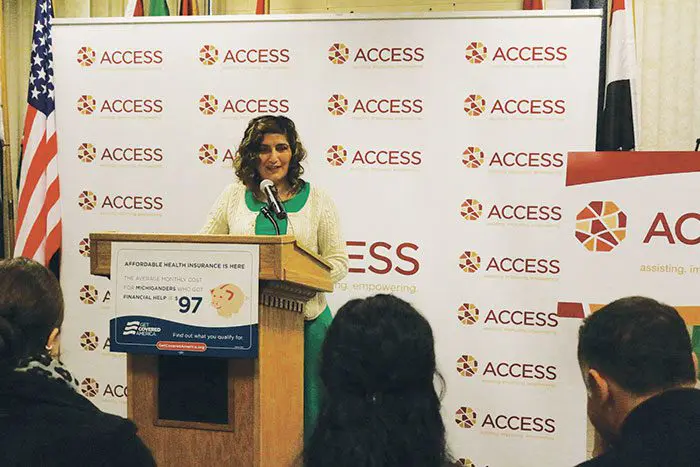
|
| Madiha Tariq, public health manager of ACCESS’ Community Health and Research Center, shares ACCESS’ plans for the start of health care open enrollment at a press conference Nov. 14 in Dearborn. |
DEARBORN — When the Affordable Care Act (ACA), commonly known as Obamacare, rolled out last year, it was dubbed by right wing politicians as a governmental takeover of the healthcare industry, but the truth is that the landmark law legally obliges citizens to get healthcare coverage through private insurers.
The federal government created a “Marketplace” where customers can efficiently shop for health insurance.
The law also expanded Medicaid, the fully state-funded healthcare program for low-income individuals and banned insurance companies from turning down consumers with pre-existing conditions or dropping coverage for those who get sick. In 2015, those who do not apply for coverage will be fined a minimum of $325 per person. The fine was $95 in 2014. The fines are to be paid when people file their federal tax forms in April.
Although in theory the law seems to be full of positives, it was off to a rough start. The Marketplace, Healthcare.gov, the website where people are encouraged to shop for insurance, has been experiencing technical problems. ACA was also criticized for shifting the burden of healthcare costs from the elderly, who generally experience more health problems, to healthier young adults. Prior to the law, insurance companies could charge seniors up to six times more than the youths, based solely on age. ACA limits the age ratio to three times, which instead of making older customers pay less, resulted in younger consumers’ paying more.
The enrollment period for 2015 started on Nov. 15 and will go on until Feb. 15.
For the second year, ACCESS is assisting people in signing up for coverage. The social services organization received a $495,000 federal grant that allows it to hire navigators to help people sign up and find the best plan.
ACA requires coverage for essential health services, including trips to the emergency room, prescription drugs, mental health services and care for pregnancy.
“If you shop for a health plan outside the Marketplace, you won’t know if it provides these essential services or not,” said Madiha Tariq, the manager of public health programs at ACCESS. “The problem is that if you don’t have these essential, minimal benefits, then you are still not in compliance with the law.”
Tariq said one of the best achievements of ACA is that it regulates insurance companies and tells consumers what policies provide basic coverage.
The average premium rate in Michigan is $97, according to Tariq, but government subsidies can bring the monthly rates well below average for low-income individuals.
People whose income is less than 133 percent of the national poverty line— $15,521 for a single household and 31,720 for a house of four— are eligible for Medicaid. ACCESS navigators also help people sign up for Medicaid through the Healthy Michigan plan.
Those who make more than 133 percent of the national poverty line are required to get insurance through the Marketplace. Tariq explained that the federal government helps low-income consumers who do not qualify for Medicaid with their premiums, but the subsidies decrease as income increases.
Tariq emphasized the importance of having healthcare coverage. She said breaking your leg could cost up to $30,000 in medical care.
She added that signing up for healthcare through the Marketplace is a form of civic engagement.
“If— God forbid— you get a kidney stone, you shouldn’t have to file for bankruptcy,” she said.
ACCESS explains the different plans available to clients and helps them navigate the website. Tariq said ACCESS assists clients with “no strings attached” and always helps educate customers to get the best available coverage for them.
“One of the biggest differences between us and a broker is that we are not here to sell insurance,” she said. “Our services are free. We are required to protect people’s privacy. We are open 9 to 5 everyday. We have some extended hours, as well.”
ACCESS has 50 navigators who are partnering with local hospitals to make sure every client is served, according to Tariq.
The social services organization is assisting customers at offices in Dearborn, Ferndale and Sterling Heights. To get in touch with an ACCESS navigator, call 1-888-670-6798 or go to www.accesshealthcaremichigan.org.






Leave a Reply